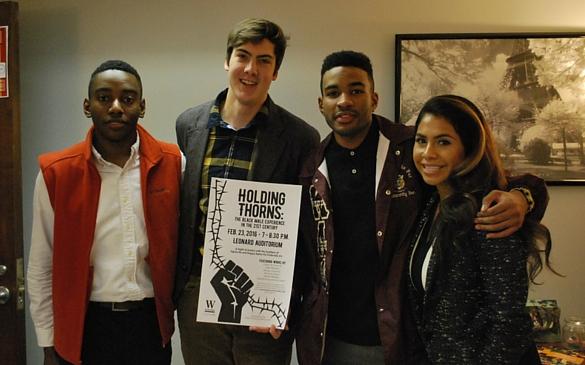By Wil Shelton, Contributing Writer
February is Black History Month, a time of remembrance and celebration of the important people and events in the history of African diaspora.
In honor of this time, brothers of Sigma Nu and Kappa Alpha Psi fraternities have partnered together to present “Holding Thorns,” a poetry reading that will take place on Feb. 23 at 7 p.m. in Leonard Auditorium.
The night will feature works by prominent black poets and some original works by Wofford freshman Grant McClure.
McClure, working with Jennifer Gutierrez-Caldwell, director of diversity and inclusion and host of the reading, came up with the idea to highlight the artistic prowess and beauty of poets such as Rickey Laurentiis, Nate Marshall, Terrance Hayes and many more.
“I was reading these poets who are really prolific, and their voices were so interesting to me because they are so charged,” McClure says. “I feel like they are some of the writers right now who are writing with purpose and intent because their people are being oppressed. The passion in that work really spoke to me.”
McClure, along with Alex Hardy, sophomore, and Tyrell Long, senior, have organized the poems so that the evening, as a whole, will be telling the narrative of what it means to be an African-American person in today’s society.
“People sometime have a batted perception of poetry, they think it’s boring and stuff like that,” Hardy says. “I think that if they come out to this, they can see how powerful it really is.”
At a time when our nation is dealing with the highest racial tension in 20 years, an event was needed that could give a voice to the experience of the black males of this country, says Gutierrez-Caldwell.
The name “Holding Thorns” was inspired by two books, “Holding Company” by Major Jackson and “Boy with Thorn” by Laurentiis.
“You think of holding as something that’s really gentle and that really contrasts with thorns, something that’s so aggressive,” McClure says. “I think it’s sort of a metaphor for ‘bearing with pain.’”
Long shared similar sentiments, yet offered his own perspective as an African-American male in America today.
“You see the flower that’s at the top of the stem, but you don’t ever really ever see what you’re holding,” Long said. “You don’t see the experiences of pain or the hardships that come with it.”
“People might see us as resilient or successful, but they don’t know what it took to get there, or what you deal with to stay there.”




























